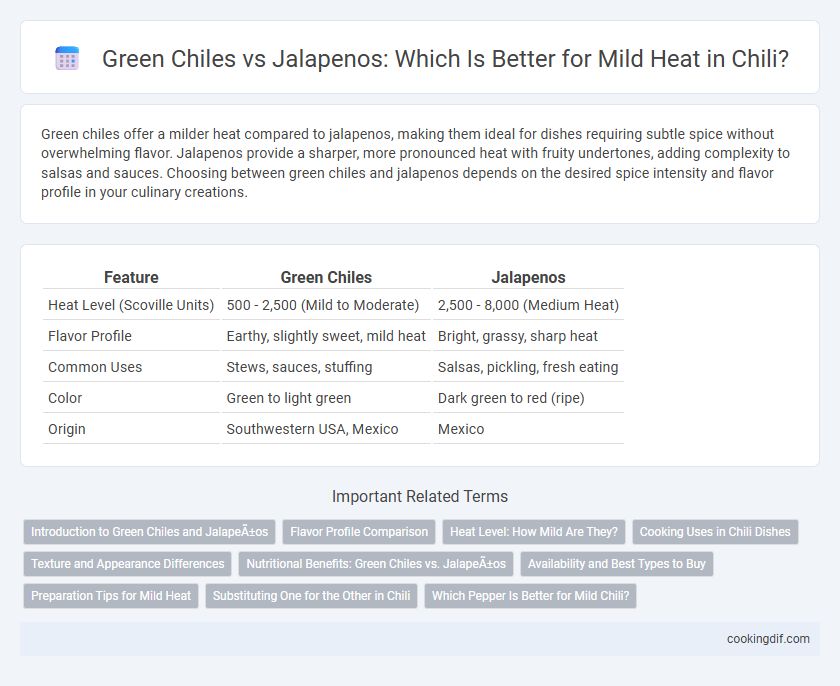Green chiles offer a milder heat compared to jalapenos, making them ideal for dishes requiring subtle spice without overwhelming flavor. Jalapenos provide a sharper, more pronounced heat with fruity undertones, adding complexity to salsas and sauces. Choosing between green chiles and jalapenos depends on the desired spice intensity and flavor profile in your culinary creations.
Table of Comparison
| Feature | Green Chiles | Jalapenos |
|---|---|---|
| Heat Level (Scoville Units) | 500 - 2,500 (Mild to Moderate) | 2,500 - 8,000 (Medium Heat) |
| Flavor Profile | Earthy, slightly sweet, mild heat | Bright, grassy, sharp heat |
| Common Uses | Stews, sauces, stuffing | Salsas, pickling, fresh eating |
| Color | Green to light green | Dark green to red (ripe) |
| Origin | Southwestern USA, Mexico | Mexico |
Introduction to Green Chiles and Jalapeños
Green chiles and jalapenos are popular chili varieties often used to add mild heat to dishes, each with distinct flavor profiles and heat levels. Green chiles, such as Hatch chiles, typically offer a smoky, slightly sweet flavor with a Scoville heat rating ranging from 1,000 to 2,500 units, making them milder than jalapenos. Jalapenos, on the other hand, provide a brighter, grassy flavor with moderate heat intensity, scoring between 2,500 and 8,000 Scoville units, ideal for adding a lively kick without overwhelming heat.
Flavor Profile Comparison
Green chiles offer a slightly sweeter, earthier flavor with mild heat levels ranging from 100 to 1,000 Scoville Heat Units (SHU), making them ideal for subtle warmth in dishes. Jalapenos provide a bright, crisp taste with a moderate heat intensity typically between 2,500 and 8,000 SHU, delivering a noticeable but not overwhelming spiciness. When comparing flavor profiles, green chiles complement dishes with nuanced, fresh undertones, while jalapenos contribute a sharper, more pronounced pepper flavor.
Heat Level: How Mild Are They?
Green chiles typically have a Scoville heat unit (SHU) rating ranging from 100 to 1,000, making them significantly milder than jalapenos, which average between 3,500 and 8,000 SHU. The lower heat level of green chiles provides a gentle warmth suitable for those seeking subtle spice without overwhelming heat. For mild chili recipes, green chiles offer a softer, earthier flavor profile while still imparting a pleasant, manageable kick compared to the more intense heat of jalapenos.
Cooking Uses in Chili Dishes
Green chiles offer a milder heat profile that enhances chili dishes with a subtle, slightly sweet flavor, ideal for those seeking gentle spice without overpowering the main ingredients. Jalapenos provide a sharper, more pronounced heat and a fresh, grassy note that intensifies the chili's spiciness and depth, perfect for heat lovers wanting a bolder kick. Both peppers can be used fresh, roasted, or pickled, but green chiles are often preferred in slow-cooked chili recipes for their nuanced flavor, while jalapenos shine in quicker-cooked or topping applications.
Texture and Appearance Differences
Green chiles offer a smoother, glossy skin and a thicker flesh compared to the thinner, wrinkled texture of jalapenos, making them ideal for stuffing and roasting. Jalapenos display a more pronounced, bright green color with occasional darker speckles, whereas green chiles tend to have a uniform, matte green shade. The flesh of green chiles is firmer and less crisp than jalapenos, influencing their mouthfeel and culinary applications in mild heat dishes.
Nutritional Benefits: Green Chiles vs. Jalapeños
Green chiles and jalapenos both offer valuable nutritional benefits, with green chiles being rich in vitamin C and antioxidants that support immune health and reduce inflammation. Jalapenos provide a higher concentration of capsaicin, which boosts metabolism and offers pain-relieving properties. Both peppers are low in calories and contribute dietary fiber, making them excellent choices for enhancing flavor while supporting overall wellness.
Availability and Best Types to Buy
Green chiles and jalapenos are both widely available in grocery stores, farmers markets, and online, with green chiles being more prevalent in Southwestern markets and jalapenos found year-round nationwide. For mild heat, popular green chile varieties include Anaheim and Hatch, known for their balanced flavor and manageable spiciness, while jalapenos like the milder Early Jalapeno and Fresno mimic this intensity with a slightly fruitier profile. Choosing fresh, firm peppers with smooth skins ensures the best quality and flavor for both green chiles and jalapenos in chili recipes.
Preparation Tips for Mild Heat
When preparing chili with green chiles or jalapenos for mild heat, deseed and devein the peppers to reduce their spiciness significantly. Roasting green chiles enhances their smoky flavor while softening their heat, making them ideal for a mellow chili base. For jalapenos, removing the membranes alongside seeds lowers the heat level, and chopping them finely allows better heat distribution without overwhelming the dish.
Substituting One for the Other in Chili
Green chiles offer a milder heat compared to jalapenos, making them ideal for chili recipes where subtle spice is preferred. Substituting green chiles for jalapenos can reduce the overall Scoville heat units, typically green chiles range from 500 to 2,500 SHU while jalapenos range from 3,500 to 8,000 SHU. This swap maintains the chili's flavor complexity while ensuring a gentler heat level suitable for sensitive palates.
Which Pepper Is Better for Mild Chili?
Green chiles offer a milder, more complex flavor profile with a Scoville heat rating ranging from 500 to 2,500, making them ideal for a subtle heat in mild chili recipes. Jalapenos, with a higher Scoville rating between 3,500 and 8,000, provide brighter, more pronounced spiciness that can easily overpower mild dishes. For a balanced mild chili, green chiles are better suited due to their gentle heat and earthy, slightly sweet taste that complements rather than dominates other ingredients.
Green Chiles vs Jalapeños for mild heat Infographic

 cookingdif.com
cookingdif.com